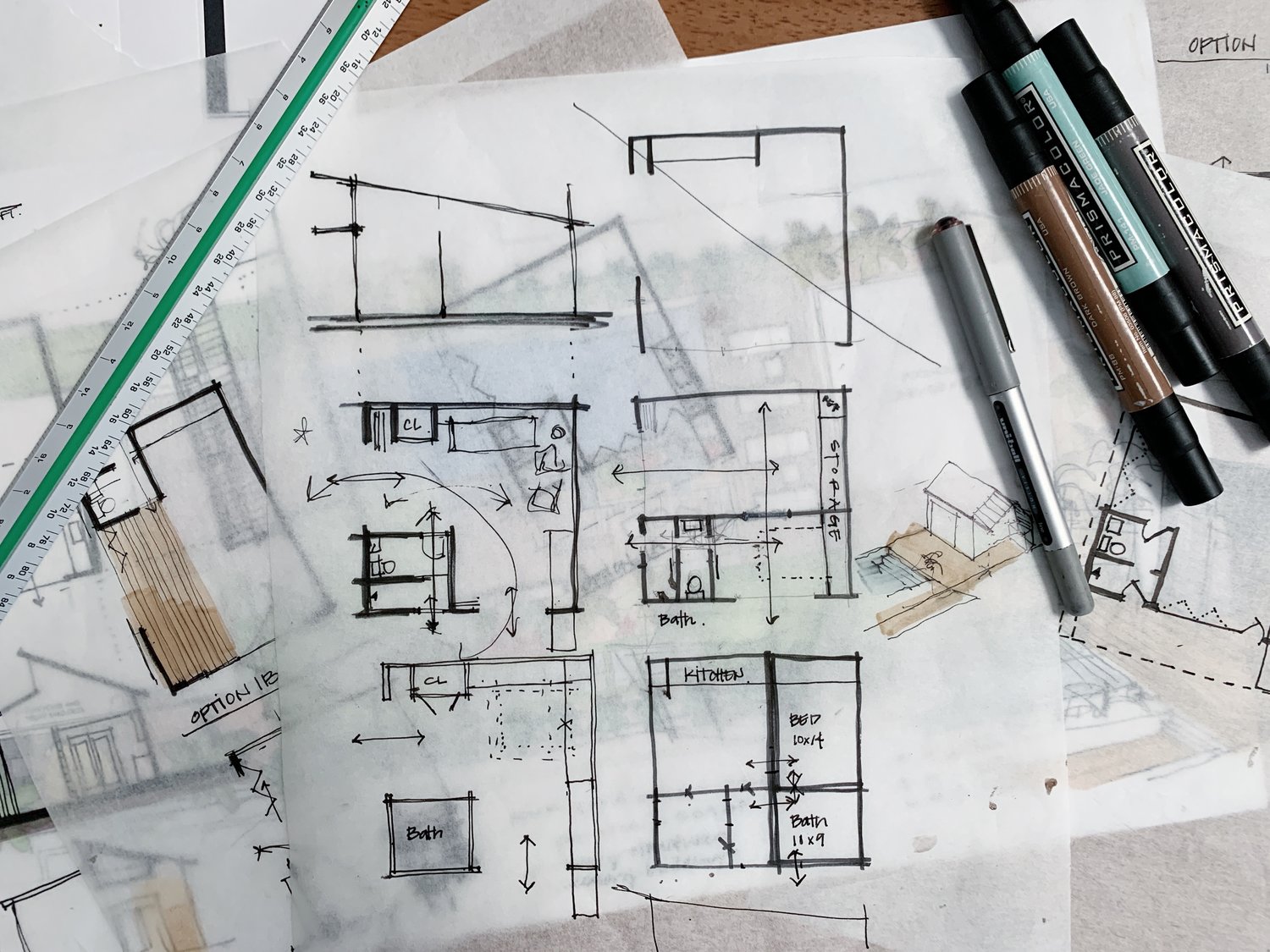Discover the Vital Abilities and High Qualities Every Architect Have To Possess
As an engineer, you recognize that success in your area goes beyond simply technical abilities. Each quality plays an important role in your ability to make rooms that influence and function well.
Creativity and Advancement
Imagination and innovation are at the heart of architecture, driving the design of rooms that inspire and function perfectly. As an engineer, you'll need to think outside package, pushing borders to produce unique remedies for your clients. You'll frequently check out new materials, techniques, and modern technologies to enhance your designs. Accepting innovation implies remaining ahead of fads while being adaptable to change.
You'll likewise attract inspiration from numerous resources-- nature, art, and even day-to-day life can stimulate fresh ideas. This capability to mix imagination with functionality enables you to resolve complex issues, ensuring your styles satisfy both practical and aesthetic requirements.
Strong Communication Abilities
While making amazing areas calls for creativity, strong communication skills are equally as vital for engineers. You require to communicate your concepts clearly to customers, professionals, and group participants. Paying attention is equally as crucial; recognizing your customer's vision assists you create layouts that absolutely meet their requirements.
You'll frequently have to discuss complicated ideas in a means that's very easy to grasp, whether you're presenting a proposal or talking about products. Effective communication cultivates partnership, ensuring everyone is on the same web page throughout the project.
Structure partnerships is crucial, also. When you develop depend on and connection, clients are much more most likely to share their issues and comments, resulting in better outcomes.
Last but not least, don't ignore the power of body movement and visual help. They can improve your message and make your presentations a lot more appealing. Solid communication abilities not only elevate your designs yet likewise reinforce your professional partnerships in the architectural globe.
Technical Efficiency in Design Software
As you browse the ever-evolving world of design, understanding design software program comes to be necessary for translating your imaginative concepts into concrete plans. Acquainting on your own with programs like AutoCAD, Revit, and SketchUp will not just enhance your design capacities however also improve your workflow. These tools enable you to produce detailed drawings, 3D designs, and also simulations that can aid you visualize and provide your ideas much more properly.
Exceling in these software program applications also increases your cooperation with designers and specialists, as everyone can work from the exact same digital foundation. Furthermore, your capability to adapt to brand-new modern technologies will certainly maintain you affordable in the area. Routinely updating your abilities and exploring new functions can set you aside from your peers, guaranteeing your layouts are accurate and ingenious. Ultimately, technical efficiency in design software is a cornerstone of successful design, helping you bring your visions to life.
Recognizing of Engineering Concepts

Recognizing design principles also enables you to prepare for prospective challenges early in the design procedure. You can make educated choices that enhance your designs when you're mindful of how various materials act under various conditions. Your styles should not just be aesthetically pleasing yet likewise practical and sustainable.
In addition, a solid understanding of engineering principles enables you to innovate within constraints. You can push imaginative borders while still adhering to safety requirements. Eventually, this understanding enriches your architectural practice and sets you apart in a competitive field.
Task Management Talents
Efficient job management abilities are essential for designers, allowing you to oversee all elements of a task from conception to completion. You'll need to collaborate with numerous stakeholders, including contractors, designers, and customers, making sure everybody's on the very same page. Setting clear goals, timelines, and spending plans is fundamental; it helps you maintain the job on the right track and within extent.
As an architect, you ought to likewise be adept at threat monitoring, recognizing possible concerns prior to they escalate. Solid communication abilities are very important, enabling you to verbalize your vision and inspire your group. You'll gain from being arranged and detail-oriented, as this aids simplify procedures and stay clear of pricey hold-ups.
Furthermore, versatility is vital; tasks frequently develop, and being versatile enables you to respond effectively to changes. Ultimately, your task management skills can significantly affect the success of your architectural endeavors, ensuring you supply high quality results on schedule and within budget.
Focus to Information
While handling projects is essential, your focus to information can make a considerable difference in the top quality of your job. Every line you draw, every product you choose, and every little spec you note adds to the general success of a project. You require to be precise, guaranteeing that your designs not only meet aesthetic requirements but likewise stick to developing policies and codes.
Missing out on even a little information can result in costly revisions or safety and security problems down the line. By growing a keen eye for information, you boost your ability to detect possible issues prior to they intensify. This vigilance not only conserves you time and sources but additionally develops your credibility as a reputable Architect. Remember, it's often the tiniest details that raise a task from good to phenomenal. Accept this ability, and let it direct your style process, making sure that your vision is carried out flawlessly.
Flexibility and Problem-Solving Skills
As an architect, you'll typically deal with unexpected modifications in style and task needs. Your capacity to welcome these changes and discover ingenious options is essential for success. Staying versatile in your strategy not just improves your problem-solving abilities yet additionally maintains your jobs on course.
Embracing Change in Style
Accepting change in design is important for architects, especially when guiding advancing customer requirements and emerging modern technologies. You require to grow versatility, as tasks often change direction based upon brand-new insights or restraints. Being open to transform allows you to discover cutting-edge strategies and produce services that resonate with your customers.
When encountered with obstacles, your analytical abilities come into play. You'll commonly need to reassess concepts and adjust intend on the fly, ensuring that the final result straightens with the customer's vision while meeting safety and regulative standards. By More about the author being flexible and clever, you not only enhance your layouts but additionally build trust fund with your customers, confirming that you Our site can navigate the complexities of contemporary design efficiently.
Innovative Solutions to Obstacles

Versatility in Job Management
While navigating the complexities of project administration, flexibility comes to be a vital possession for engineers. You'll often face unexpected obstacles, from layout adjustments to spending plan restrictions, requiring quick reasoning and flexibility. Accepting modification allows you to pivot your strategies and discover ingenious options, making sure job success.
Strong problem-solving abilities are crucial; they allow you to analyze circumstances, evaluate options, and carry out reliable services on the fly. When collaborating with diverse teams, being open to responses and different ideas cultivates cooperation and stimulates creativity.
Frequently Asked Questions
What Educational Background Is Called For to Become a Designer?
To become a designer, you'll need at the very least a professional level in architecture, usually a Bachelor's or Master's. Acquiring and finishing an internship licensure with examinations is necessary for your job improvement.
How Important Is Networking in the Architecture Area?
Networking's important in style. It assists you construct connections, uncover work opportunities, and gain understandings from skilled professionals. By linking with others, you boost your occupation potential customers and stay upgraded on sector trends and growths.
What Are the Usual Occupation Paths for Architects?
Typical job courses for designers include layout duties in firms, job monitoring, urban preparation, and specialized locations like lasting design. Architect. You may likewise discover mentor or consulting, relying on your experiences and interests
How Can Engineers Keep Updated With Market Trends?
To remain upgraded with sector patterns, you must routinely attend conferences, join specialist associations, register for pertinent publications, and engage with on-line forums. Networking with peers also aids you acquire understandings right into arising growths in architecture.
What Function Does Sustainability Play in Modern Style?
Sustainability forms contemporary style by emphasizing energy effectiveness, resource conservation, and environmentally friendly materials. You'll develop areas that lessen environmental impact, boost resident well-being, and respond to climate difficulties, making your designs much more pertinent and impactful.
While designing exceptional rooms calls for creativity, strong interaction skills are simply as critical for architects. Strong interaction skills not only boost your layouts but additionally reinforce your professional connections in the building world.
Effectiveness in style software lays the foundation for a much deeper understanding of engineering concepts, which is vital for architects.As an engineer, you'll often encounter unanticipated changes in style and project needs.Welcoming change visit homepage in layout is important for architects, especially when guiding developing client requirements and arising technologies.